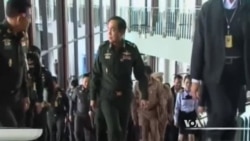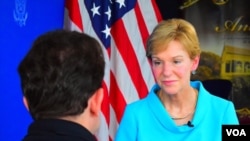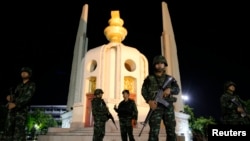BANGKOK —
Ousted Thai Prime Minister Yingluck Shinawatra and dozens of other political figures appear to have been detained after arriving for meetings with military leaders who took power in a coup this week.
After being summoned by the army, Yingluck and others arrived Friday at a military installation in Bangkok. Military officials are quoted as confirming that Yingluck is now in custody.
Thai media reports say her aides were bringing her personal effects to a military base outside Bangkok. It is not clear if the other politicians in custody have been taken to the same camp.
U.S. suspends military aid
Meanwhile, the United States has suspended $3.5 million in military aid to Thailand, and says it is reviewing another $7 million in assistance for more cuts.
Friday's announcement came just hours after the Thai military took the country's ousted prime minister into custody, in an apparent move to solidify its grip on power.
The U.S. State Department also warned U.S. citizens against non-essential travel to the country.
The whereabouts of Yingluck and dozens of other political figures remained unclear early Saturday -- nearly two days after the Thai army announced its military coup.
The military already had banned Yingluck and more than 150 other political figures from leaving Thailand without permission.
It is not clear if the other politicians in custody are in the same camp. The country's caretaker prime minister, Niwattumrong Boosongpaisan, was among those summoned by military authorities. Until the bloodless coup, he had been in charge of the kingdom on an acting basis, after a court ordered Yingluck to step down earlier this month on charges of nepotism.
Broadcasters in Thailand began resuming normal operations late Friday.
Clampdown
Prayuth, the self-declared acting prime minister and ardent monarchist, was able to intimidate his two previous civilian predecessors into reporting to an army facility under threat of arrest if they disobeyed. A total of 155 people have been told not to leave the country.
The junta boss on Friday also summoned civil servants and invited the diplomatic corps and foreign military attaches for meetings to explain the new realities on the ground in the kingdom.
As was apparently the case with most other heads of missions, U.S. Ambassador Kristie Kenney did not accept the invitation. In a VOA interview, she said that, despite the imposition of martial law on Tuesday, the coup announcement two days later came “as a bit of a surprise” and it will hurt the relationship between Bangkok and Washington.
“We have a longstanding relationship,” Kenney said. “But a coup in Thailand will have a negative implication. There'll be a high-level review in Washington by the United States government of our assistance and our engagements with Thailand, especially the Thai military. So that'll be looked at very carefully.”
2006: Army overthrows Prime Minister Thaksin Shinawatra
2007: The pro-Thaksin People Power Party wins elections
2008: Anti-Thaksin protesters, known as Yellow Shirts, stage months of demonstrations and briefly paralyze airports. Abhisit Vejjajiva becomes prime minister.
2010: Massive pro-Thaksin "red shirt" protests are held in Bangkok, dozens are killed
2011: Yingluck Shinawatra, sister of Thaksin, elected prime minister 2013: Anti-government protesters hold massive demonstrations, Yingluck calls new elections
2014: Protesters camp in Bangkok, Yingluck government is removed, army declares martial law then seizes power in a May coup
Throughout most of Friday, Thai TV channels continued to carry only the army station’s programming, which was mostly patriotic music interspersed with pronouncements from the new National Peace and Order Maintaining Council. Some channels returned to regular broadcasts in the evening.
Despite the coup, Thailand’s 12th in eight decades, there was little significant troop presence on the streets of the capital.
A small but significant demonstration, organized by university students, defied the military order of no public gatherings by more than five people. They vented their anger at soldiers and denounced the coup.
The most serious immediate impact from the coup is likely to be on Thailand’s lucrative tourism industry.
On the resort island of Phuket, businessman Sanga Ruangwattanakul said the coup has worsened an already bad year following months of political turmoil.
"The big picture: We have had a lot of cancellations from this year,” he said, and going forward “all the online bookings have been cancelled."
The country, now under a seven-hour nightly curfew, has no idea how long military rule and its various restrictions will continue. After the last coup in 2006, elections were not held for another 15 months.
After being summoned by the army, Yingluck and others arrived Friday at a military installation in Bangkok. Military officials are quoted as confirming that Yingluck is now in custody.
Thai media reports say her aides were bringing her personal effects to a military base outside Bangkok. It is not clear if the other politicians in custody have been taken to the same camp.
U.S. suspends military aid
Meanwhile, the United States has suspended $3.5 million in military aid to Thailand, and says it is reviewing another $7 million in assistance for more cuts.
Friday's announcement came just hours after the Thai military took the country's ousted prime minister into custody, in an apparent move to solidify its grip on power.
The U.S. State Department also warned U.S. citizens against non-essential travel to the country.
The whereabouts of Yingluck and dozens of other political figures remained unclear early Saturday -- nearly two days after the Thai army announced its military coup.
The military already had banned Yingluck and more than 150 other political figures from leaving Thailand without permission.
It is not clear if the other politicians in custody are in the same camp. The country's caretaker prime minister, Niwattumrong Boosongpaisan, was among those summoned by military authorities. Until the bloodless coup, he had been in charge of the kingdom on an acting basis, after a court ordered Yingluck to step down earlier this month on charges of nepotism.
Broadcasters in Thailand began resuming normal operations late Friday.
Clampdown
Prayuth, the self-declared acting prime minister and ardent monarchist, was able to intimidate his two previous civilian predecessors into reporting to an army facility under threat of arrest if they disobeyed. A total of 155 people have been told not to leave the country.
The junta boss on Friday also summoned civil servants and invited the diplomatic corps and foreign military attaches for meetings to explain the new realities on the ground in the kingdom.
As was apparently the case with most other heads of missions, U.S. Ambassador Kristie Kenney did not accept the invitation. In a VOA interview, she said that, despite the imposition of martial law on Tuesday, the coup announcement two days later came “as a bit of a surprise” and it will hurt the relationship between Bangkok and Washington.
“We have a longstanding relationship,” Kenney said. “But a coup in Thailand will have a negative implication. There'll be a high-level review in Washington by the United States government of our assistance and our engagements with Thailand, especially the Thai military. So that'll be looked at very carefully.”
Political Developments in Thailand
Major Political Developments in Thailand:2006: Army overthrows Prime Minister Thaksin Shinawatra
2007: The pro-Thaksin People Power Party wins elections
2008: Anti-Thaksin protesters, known as Yellow Shirts, stage months of demonstrations and briefly paralyze airports. Abhisit Vejjajiva becomes prime minister.
2010: Massive pro-Thaksin "red shirt" protests are held in Bangkok, dozens are killed
2011: Yingluck Shinawatra, sister of Thaksin, elected prime minister 2013: Anti-government protesters hold massive demonstrations, Yingluck calls new elections
2014: Protesters camp in Bangkok, Yingluck government is removed, army declares martial law then seizes power in a May coup
Despite the coup, Thailand’s 12th in eight decades, there was little significant troop presence on the streets of the capital.
A small but significant demonstration, organized by university students, defied the military order of no public gatherings by more than five people. They vented their anger at soldiers and denounced the coup.
The most serious immediate impact from the coup is likely to be on Thailand’s lucrative tourism industry.
On the resort island of Phuket, businessman Sanga Ruangwattanakul said the coup has worsened an already bad year following months of political turmoil.
"The big picture: We have had a lot of cancellations from this year,” he said, and going forward “all the online bookings have been cancelled."
The country, now under a seven-hour nightly curfew, has no idea how long military rule and its various restrictions will continue. After the last coup in 2006, elections were not held for another 15 months.








